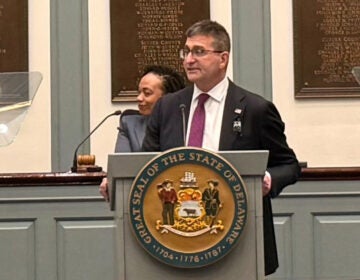Suspicious payments and dirty tricks: Will husband’s controversies impact Lt. Gov. Bethany Hall-Long’s bid for governor?
The candidate calls current and past issues revolving around spouse Dana Long an irrelevant distraction, but questions abound about her transparency.
Listen 3:39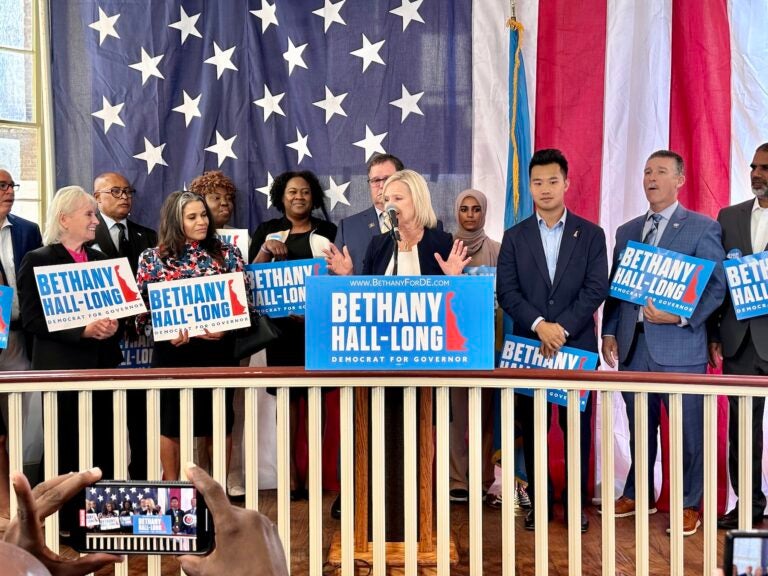
Delaware's Lieutenant Governor Bethany Hall-Long takes the stage to announce her candidacy for the governors office. (Johnny Perez-Gonzalez/WHYY)
From Philly and the Pa. suburbs to South Jersey and Delaware, what would you like WHYY News to cover? Let us know!
This reporting was supported by a statehouse coverage grant from the Corporation for Public Broadcasting.
When Delaware Lt. Gov. Bethany Hall-Long bounded onstage in September to announce her candidacy for governor, she waved her closest ally and confidante onto the crowded platform.
A burly, bespectacled guy strode toward Hall-Long and the two shared a warm embrace. The man was Dana Long, the lieutenant governor’s husband of 36 years.
As Hall-Long sketched out her vision for making Delaware a better place to live, work, and raise a family, her husband — a former military man and her trusty campaign treasurer since she entered politics in 2000 — stood behind her, beaming with pride.
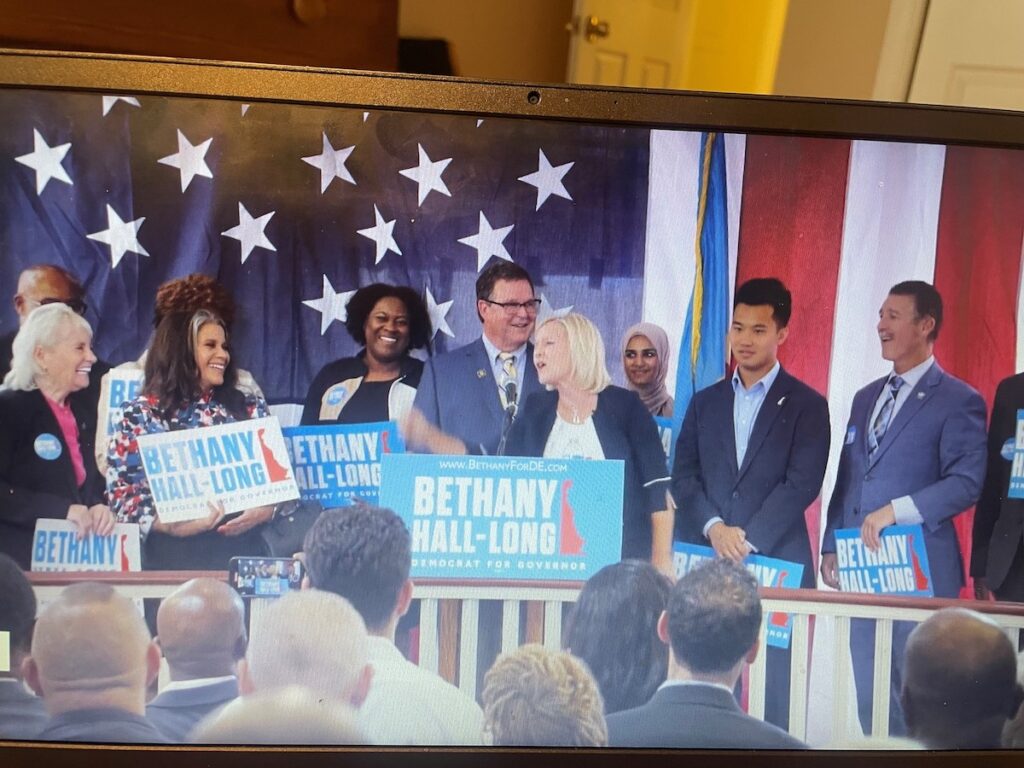
The official start of her long-anticipated gubernatorial bid in downtown Wilmington was a watershed day in the couple’s four-decade journey that began at a rural Sussex County high school, where the scholarly, athletic farm girl first fell for the older football player.
But while the duo aspiring to be Delaware’s first couple radiated optimism during Hall-Long’s Sept. 12 campaign kickoff, trouble that had been brewing for weeks was about to burst into public view.
Within days of her launch, Hall-Long abruptly suspended fundraising — including a major event that was to be hosted by staunch supporter Gov. John Carney — and announced “there may have been” campaign finance reporting issues she needed to address.
What the lieutenant governor didn’t reveal was that leaders and advisers on her fledgling team had been frustrated because Hall-Long had stalled in providing access to campaign bank accounts they needed to conduct a routine compliance check.
When she finally provided them, leaders were troubled to find several checks totaling more than $207,000 to Dana Long since 2016, even though he was never a paid campaign staffer.
They were equally disturbed that contrary to Delaware law, candidate Hall-Long and her husband/treasurer had never disclosed any of the $207,000 paid to him in the 13 campaign finance reports they filed during that seven-year period.
Hall-Long told her team the checks to Dana Long were repayments for loans that she — not her husband — had made to the campaigns. The loans she described, however, had not been recorded in the reports, though by law they should have been.
Hall-Long’s campaign and fundraising managers abruptly quit, as did several advisers, and advised her to end her candidacy. She initially said she would drop out, but changed her mind, several insiders have told WHYY News.
In November, Hall-Long attempted to quell the burgeoning scandal by amending seven years of campaign finance reports. The new filings showed $308,000 in loans from Hall-Long and $207,000 in repayments to herself — not her husband. “Bethany and her husband covered various campaign-related expenses using personal credit cards and loans that were not accurately reflected,” her campaign said.
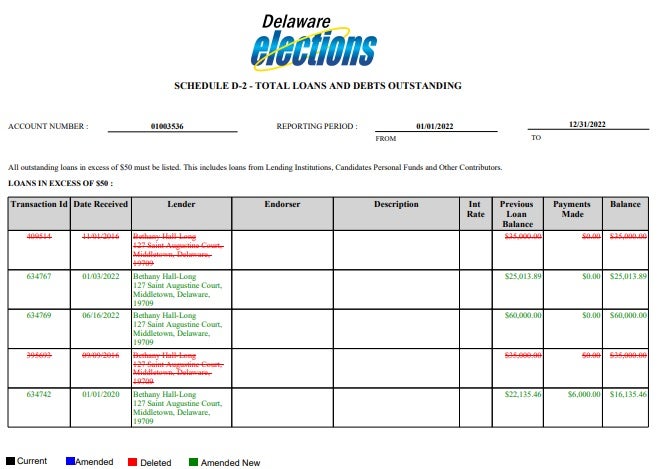
A WHYY News investigation documented the turmoil inside her campaign and the still unanswered questions swirling around the couple and their handling of donations since 2016.
The $207,000 in previously unreported payments to Dana Long are not the first time, however, that the lieutenant governor’s husband has brought negative attention to or raised questions about Hall-Long’s campaigns, political machinations, and judgment in office.
Consider these scenarios that have unfolded in the last decade as Hall-Long rose to political prominence:
- In 2014, Dana Long was arrested for theft a week before Election Day for stealing Republican campaign signs in the middle of the night. At the time his wife was in a tight, heated race with the GOP’s John Marino. The alleged crime was captured on video and posted to YouTube, and received news coverage across the nation and as far away as England. A week later, his wife squeaked to victory by 267 votes out of 12,193 cast.
- During her 2016 race for lieutenant governor, when Dana Long was working as a New Castle County inspector of rent-subsidized Section 8 houses, an audiotape recording surfaced which revealed that during that 2014 race, he was accused of stealing the county’s list of Section 8 tenants, calling those in his wife’s district, and telling them to vote for her. Then-County Executive Tom Gordon said in the recording, secretly made by his top aide, that he couldn’t fire Long because he needed state Sen. Hall-Long’s help in stopping other state lawmakers from reducing the county’s share of real estate transfer taxes by up to $10 million.
- In 2018, Long had to resign from the county job after he and Tanner Polce, the policy director for Lt. Gov. Hall-Long, formed a limited liability company and bought nine Section 8 homes he had been inspecting in Edgemoor Gardens. The gritty neighborhood of mostly subsidized rental units on the northern outskirts of Wilmington has long had “very high rates of vacancy, crime and blight,” the county said in a recent news release. A state law requires Hall-Long to report her spouse’s landlord business in her annual financial reports, but she has never done so.
The controversies that have swirled around Long and his wife over the years illustrate how politics and government often operate in one of the nation’s smallest states. Politicians from President Joe Biden on down to small-town municipal leaders like to boast about the so-called “Delaware Way” of government, with officials rolling up their sleeves and reaching across ideological and party divides to accomplish what’s best for the state’s 1 million residents.
But the way Delaware operates has a seamier side, too. Nepotism is rampant, with many spouses and children of elected officials parlaying their family connections to find jobs, often within government, or trading on the politician’s power to pull levers within the system. Campaign finance and other required reports are often filled out incompletely or erroneously, regardless of the law.
Lt. Gov. Hall-Long and Dana Long would not agree to an interview for this story, in keeping with their posture during the nearly three months since she revealed her campaign reports had serious problems.
Instead, Hall-Long issued a statement to WHYY News through her campaign that makes it clear she wants voters and potential donors to disregard current and former issues involving her husband.
“My husband is a veteran, loving father, and caring husband,” her statement said. “He is not a candidate for governor, and rehashing these old rumors and stories that have already been addressed is distracting from what’s important in this election: working to move Delaware forward by lowering costs, expanding the workforce, and strengthening education.”

Hall-Long had apologized in November for sloppy campaign finance reporting, saying in a written statement that no wrongdoing was found by Summit CPA, the Middletown-area accounting firm her campaign hired to conduct what she said was an audit. “I regret the errors and confusion this has caused, although unintentionally done,” Hall-Long said.
In the weeks since, however, Hall-Long has ignored calls by government transparency advocates, state Republican Party chair Julianne Murray, and New Castle County Executive Matt Meyer — her opponent in the September Democratic gubernatorial primary — to release Summit CPA’s report. Summit CPA officials have not responded to requests from WHYY News for comment.
Meyer obliquely addressed the issues surrounding his primary foe and her husband.
“When I go to work each day both as county executive and running for governor, I know that I and my family are in this for public service and not self-service,” Meyer said. “And I think everyone who goes into this should be in it for that reason.”

Samuel B. Hoff, professor emeritus of political science at Delaware State University and an observer of Delaware politics for more than three decades, says the issues revolving around the lieutenant governor’s husband and her campaigns are not trivial matters, and could influence voters as the public’s trust of government at the local and federal level continues to shrink.
Hoff said that while Hall-Long is a popular politician in a Democratic-dominated state, has twice won statewide office, and would be the state’s second woman governor, the “drip-drip of controversies,” especially the fresh one involving campaign finances, “isn’t healthy. It’s one of those demerits against her campaign.”
Hoff added that Dana Long’s “efforts on behalf of his wife have been counterproductive to the point where the worst-case scenario is that it will result in her loss.”
‘You set your spouse up for treasurer, that itself is questionable’
Bethany Hall and Dana Armon Long began dating when she was a freshman at Indian River High in Dagsboro, where he was a senior who played end on the football team. She played field hockey and earned a spot on the National Honor Society by the time she graduated in 1981, three years after him.

Hall went off to nursing school at Thomas Jefferson University in Philadelphia, and Long joined the U.S. Navy. Their paths led the couple to Virginia, where he worked as a Navy data systems technician and she obtained her doctorate in nursing.
They married in 1987, and returned to Delaware in the early 1990s, when he left the military and she began teaching at the University of Delaware, where she is still a nursing professor.
Over the next decade, Dana Long’s Facebook page says, he worked as a senior network analyst for I-Net Inc., supervisor for the Avon Products cosmetics company, and as a computer technician for accounting firm Ernst & Young.
The couple had a son and settled into a comfortable lifestyle, paying $342,000 in 1998 for a sprawling, five-bedroom home at Back Creek, a new golf course community north of Middletown.
But Hall-Long, a descendant of Delaware’s 15th governor, David Hall, had a hankering for politics herself. In 2000, she ran unsuccessfully for a state House seat, with her husband serving as her volunteer treasurer.
He continued keeping the books as she followed that loss by winning eight consecutive elections — serving six years in the House, eight in the Senate, and the last eight as lieutenant governor. As treasurer he oversaw the receipt, spending, and documentation of more than $2 million she raised during her campaigns.
Hoff, the Delaware State University professor, said the seeds of the spotlight now on the couple as Hall-Long seeks state government’s highest elective post were sown during her first campaign.
“You set your spouse up for treasurer, that itself is questionable,” Hoff said. “At some point, it should have been done with the consulting of an attorney to make sure that everything’s on the up and up.”
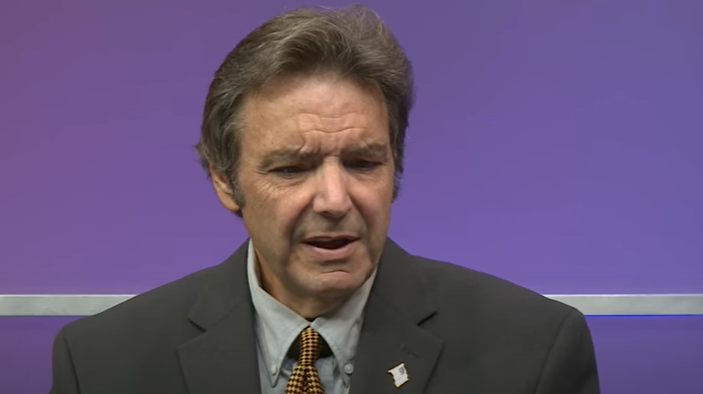
‘We got you, brother. Your license plate, your face, and everything’
While Long racked up victories in three House and two Senate races, her husband remained out of the public eye.
That all changed in 2014, in the dark of the night one week before Election Day.
Hall-Long faced a stiff challenge that year in her heavily Democratic district from Republican John Marino, a retired New York City cop.
Marino told WHYY News this month that in the weeks leading up to Election Day 2014, his campaign signs kept disappearing. Marino said several signs were found floating in one of the golf course ponds in Hall-Long’s Back Creek neighborhood.
The problem worsened at the end of October, he said, when his team put up signs that said “Fix The Economy! Vote Republican” and “Delaware Needs Jobs! Vote Republican!,” but they kept vanishing from the roadside.
So at about 2:30 a.m. on Oct. 29, one of Marino’s campaign aides took a video camera out to Del. 299, the artery that cuts through Middletown.
“We know that they’re gonna come, as creatures of habit do, and we will catch him on tape,” the narrator says at 2:35 a.m. “We think sometime around between 3:30 and 5 o’clock, he’s gonna show up before work traffic starts.”
The narrator shows the wording that says the signs were paid for by the Republican Party of Delaware. “So these are legal signs on the side of the road, and we’re gonna get this guy,” he says. “So let’s get in the car and wait for him.”
At 4:01 a.m., a car pulled up and parked. Dana Long emerged and began pulling up signs. The camera operator and another man chased him.
“We got you taking those signs,” one called. “Put them back. That is theft.”
“No it’s not,” retorted Long.
They kept pursuing him, and he attempted to cover his face with signs he had pilfered.

When one demanded, “What are you doing this for?,” Long fired back, “Don’t stop me. There is no, there is no name on these signs.”
They yelled that the GOP owns the signs, but Long trudged to his car, opened the trunk, and flung them inside as one man called, “We got you, brother. We got your license plate, your face, and everything.”
Before he drove off, they looked inside and remarked that other signs were in the sedan’s cabin.
“They’re all in there,” one said. “I got it all. We got it all.”
‘My husband is the man depicted in the video’ stealing GOP signs
The video was posted to YouTube and provided to Middletown police, which quickly concluded that the sign bandit was Dana Long. They arrested him that afternoon for theft under $1,500, a misdemeanor punishable by up to one year in prison and a $2,300 fine.
Police said 28 campaign signs were stolen Oct. 26 on Del. 299, just hours after they had been placed there. They were replaced the next day, and stolen again, police said. That led to the Oct. 29 stakeout that snagged the senator’s husband.
Dana Long did not comment but Hall-Long immediately acknowledged that “my husband is the man depicted in the video” taking the GOP signs. She denied any involvement herself.
“Sadly, this race has become tough and personal,” she said. “My husband is my high school sweetheart and he loves me very much. I was not aware that he had allowed his frustration over the campaign attacks to get the better of him. Of course I’m disappointed and wish that it had not happened.”
Hall-Long said her husband gave the signs he took to the state Democratic Party so they could be returned to the GOP. Then-state Democratic Chairman John Daniello condemned Long’s alleged actions as “absolutely unacceptable,” but said it happens with various candidates “each campaign season.”
On Election Day, however, Hall-Long retained her Senate seat, winning 51% of the vote.
Although the arrest of the state senator’s husband received widespread news coverage, the media soon lost interest. No accounts of court hearings in the case, or the disposition of the charges, could be found online.
Nor is there any record of Long’s arrest in Delaware court files. Authorities familiar with the state judicial system said that even if he was convicted, the lack of any public records almost certainly means Dana Long succeeded in having his misdemeanor theft case expunged.
‘We got her because of her husband. And she’s got clout’
With her husband’s arrest seemingly in the rear-view mirror, in 2016 Hall-Long set her sights on higher office — lieutenant governor. She entered a crowded primary race to be first in line of succession for the governorship, but that April — five months before the election — her husband was back in the news, accused again of unethical meddling in the 2014 election.
That occurred after David Grimaldi, who had been fired as top aide to County Executive Tom Gordon, made public a secret tape recording he had made in 2015 of a conversation with Gordon.
The tape centered on allegations about Long, who in 2009 had been hired through a temp agency to be a county inspector of properties rented to lower-income families with Section 8 certificates that guarantee federal rent subsidies.
Grimaldi and Gordon were discussing a complaint to the county by a Section 8 recipient who had purportedly been disqualified from receiving the valuable federal housing subsidies that allow working tenants to pay as little as 30% of their income for rent and utilities.
For example, someone who earns $2,000 a month could pay as little as $600 for a home where the rent and utilities cost $1,200, with the federal government paying the difference.
Grimaldi said the woman had complained that Long would not take his calls but “can call me to tell me to go vote for his wife.” Grimaldi said county officials confronted Long and “he admitted that he basically stole our Section 8 list, which by the way is really confidential. Not even police can get this [expletive] thing.”
Grimaldi told Gordon that Long explained, “Yeah, but I was doing it all on my own time. I cold call only the people in my district.”
Sounding incredulous, Grimaldi said: “He’s their inspector, their housing inspector, calling them, telling them, ‘Are you going to vote for my wife?’”
Gordon said on the recording that he had wanted to fire Long but when another county official told him Long was married to state Sen. Hall-Long, he jettisoned that idea because “everybody deserves a second chance.”
Gordon also said he didn’t want to jeopardize Hall-Long’s support in the General Assembly on the transfer tax issue. The state and county evenly split the 3% fee then charged in real estate transactions — each getting, for example, $4,500 when a property sold for $300,000. But in 2015 some lawmakers were pushing to give the state a bigger share.
In the previous year, the county had collected $25.3 million from that tax, accounting for 15% of the government’s $172.9 million in general fund revenues.
Losing $10 million “would be devastating,” Gordon had told the Wilmington News Journal in 2015, when the effort to change the formula was being contemplated by the legislative Joint Finance Committee. Then-county police chief Elmer Setting told the newspaper it would be “death blow” to his force because almost all transfer tax revenue went toward public safety spending.
Gordon doubled down during the tape recording on his need to have Hall-Long in his corner.
“She would do anything for her husband,” Gordon said. “We got her because of her husband. And she’s got clout down there in the Senate.”
The legislative effort in 2015 to change the transfer tax formula ultimately fizzled.
‘I am more upset that Bethany is being dragged into this’
The fallout from the explosive tape recording released a year later played out in the press for several days.
Gordon responded by saying Grimaldi had been misinformed. Gordon said the county had investigated the issue but found that no Section 8 lists had been “downloaded” and that the woman who complained would not agree to an interview with county investigators, so the case was closed as unsubstantiated.
Long, who had never made any public statements about the campaign signs he was caught on tape taking, sent media outlets a statement from his wife’s campaign email that called the allegations against him “categorically false.”
Long’s statement said he “made clear to New Castle County officials last summer — when this issue was resolved — I did not use any Section 8 lists for campaign purposes. Period. While I am upset that my right to confidentiality has been breached over an allegation with zero evidence behind it, I am more upset that Bethany is being dragged into this ludicrous story.”
Sen. Hall-Long piggybacked on her husband’s statement.
“I don’t want to comment other than to say the accusations are false,” Hall-Long told the Wilmington newspaper, adding that the latest accusations against her husband were “a private, personnel matter that he was exonerated of.”
She also told the paper she was “disturbed” by the recording but had never spoken to Gordon or anyone else in county government about her husband’s job, and stressed, “I have not agreed to take any position on policy because of my husband’s employment.”
Marino, the candidate she defeated in 2014, wasn’t satisfied. He told Wilmington radio station WDEL that Hall-Long should resign and that the recording was clear evidence of “dirty politics, and about corruption and cronyism in government.”
He pointed out that Hall-Long won 77% of the vote against him from one polling place where many Section 8 residents live. “It’s very suspicious,” he said. “The voters got railroaded here.”
Meyer also weighed in at the time, because he was running for county executive against Gordon.
“This news is disappointing,” Meyer said, “but hardly surprising.”
Hall-Long’s husband buys Section 8 properties with her staffer
In the end, Dana Long kept his Section 8 inspector’s job.
His wife won a decisive victory over five other candidates in the 2016 Democratic primary for lieutenant governor, and cruised to victory in the general election.
Meyer defeated Gordon in the 2016 primary for county executive, and rolled to victory that November.
Meyer said this month that upon taking office, he focused on providing services to the county’s 560,000 residents and didn’t involve himself in lesser matters such as Dana Long’s job through a temp agency.
Meanwhile, Dana Long set his sights on a new venture — buying Section 8 properties in Edgemoor Gardens, where he conducted the annual inspections of its Section 8 homes.
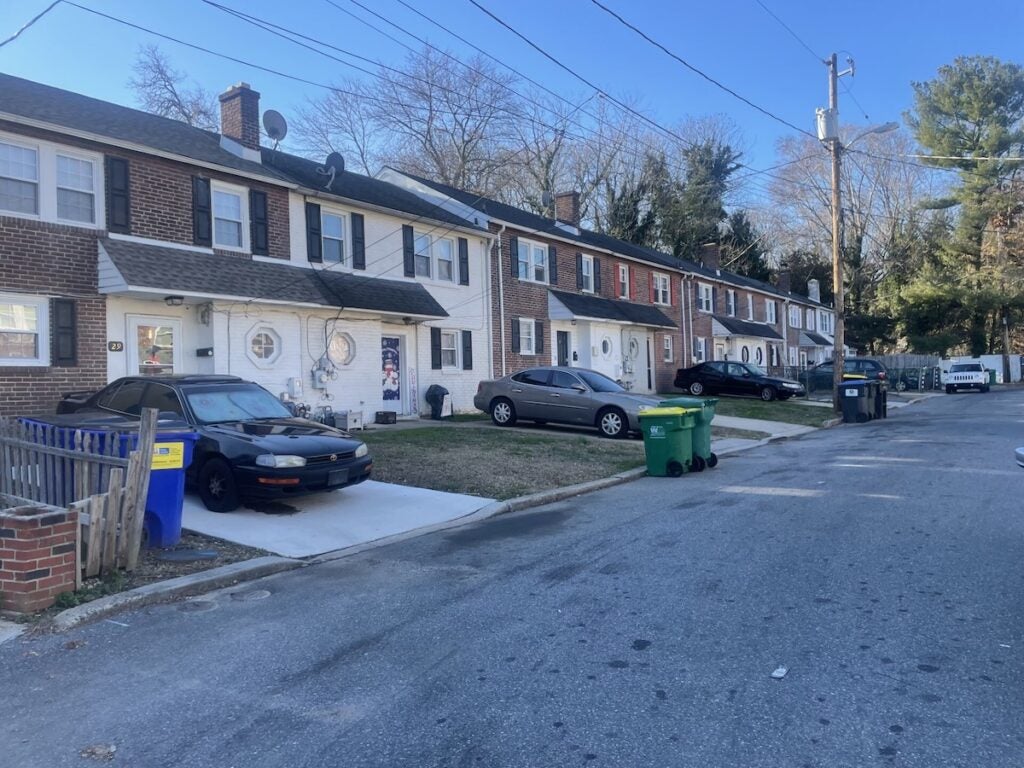
Long began negotiating with Billie Chubb, a veteran real estate agent and investor who at the time owned 23 of the 280 small, tightly clustered two-story homes in the gritty, hilly development off Interstate 495.
Chubb said she respected Long as a tough and fair inspector. Sometime around 2017, Chubb said, Long mentioned he might want more job stability and was interested in buying rental properties. He was earning about $20 an hour, working roughly 20 to 30 hours a week, county pay records show.
Chubb said the timing was perfect because she was preparing to liquidate her Edgemoor Gardens holdings. She said many prospective landlords shied away from the neighborhood because of its reputation for violence and difficult tenants.
But Long said he was definitely interested, and they agreed on a tentative plan for him to pay $550,000 for nine homes occupied by Section 8 tenants. The deal took more than a year to complete, she said, because Long said he needed time to get the 20% down payment together.
Long didn’t have to look far to find a partner. He teamed up with Tanner Polce, his wife’s policy director in the lieutenant governor’s office and a member of Dover City Council.
In January 2018, Long and Polce formed TWP and BML, LLC, with Long signing the certificate of formation as the “authorized person” under Delaware’s rules for limited liability companies, state records show.
The $550,000 sale took place in August 2018, county property records show, with Long and Polce, operating as TWP and BML, LLC, putting down $141,000. They took out a $409,000 mortgage and assigned the rents collected to the lender, Fulton Bank. In 2022, they paid off that mortgage and took out a new one for $744,000, property records show.
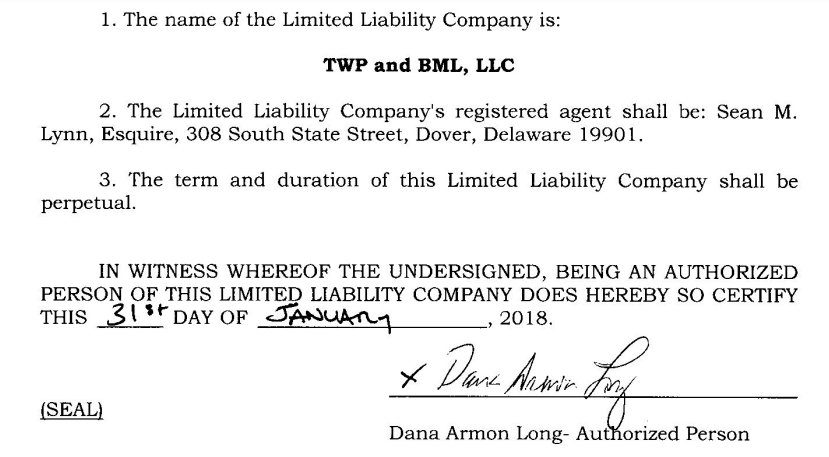
Lt. Gov. Hall-Long is not a member of the limited liability company, but Chubb said she joined her husband and government aide Polce when they signed the purchase documents, which listed the family’s Back Creek home as the buyer’s address.
“She was at the table, but not part of the transaction,” Chubb said.
The purchases ended Long’s career as an inspector. Carrie Casey, who oversees the county’s housing programs, said Long told her he had bought some Section 8 homes. “We both mutually agreed that he could no longer be a Section 8 inspector,” said Casey, who said he had been a solid employee.
Since Long and Polce bought the homes, Edgemoor Gardens has received a significant investment in public funds designed to improve the long-distressed neighborhood.
In 2019, the county opened a new one-acre park that featured a playground, basketball court, and paved perimeter parking trail. The project, which was partly funded by the state, broke ground one month before Long and Polce bought their properties.

In addition, in 2019 and 2020, the Carney administration allocated more than $500,000 to renovate 13 vacant homes in the neighborhood.
Hall-Long said through a spokesman she played no role in steering state money to the neighborhood where her husband and former aide have nine homes.
Polce, who left the lieutenant governor’s office and resigned from his Dover City Council seat in 2020, is now the chief advancement officer for the Brandywine Valley SPCA. Polce did not respond to requests for an interview about the business venture with Hall-Long’s husband that began while he worked for her.
A WHYY News reporter visited the Edgemoor Gardens and the nine properties this month. No one answered the door at any of them, but all of the exteriors appeared tidy and well-kept. An employee for another investor said Long has been a solid landlord, and pointed to new roofs and driveways at a few of the houses.
Chubb said the deal is paying big dividends for Long and Polce because the properties she sold for an average of $61,000 have probably doubled in value.
“I wish I still had them,” Chubb said.
Hall-Long failed to follow law and disclose husband’s business
When Dana Long bought the Edgemoor Gardens homes in 2018, his actions had triggered a legal duty for Lt. Gov. Hall-Long. She’d have to include her husband’s new business venture on her financial disclosure report for that year and beyond.
The requirement is spelled out in the law that governs financial disclosure reports that must be filed annually with the Delaware Public Integrity Commission by more than 300 state officials in the legislative, executive, and judicial branches, including all candidates for a state elective office. Hall-Long has been required to file one since she first ran for the state House in 2000.
Officials are required to list their holdings, creditors, and affiliations in categories such as instruments of ownership, business enterprises, constructively controlled assets, income for services rendered, and gifts. The reports are typically two or three pages long.
The law is clear when it comes to constructively controlled assets valued at more than $5,000. The report must include not only their own financial interests and those held jointly with their spouse or children, but also “any financial interest of the spouse or minor child.”
Anyone who “knowingly” files a false report can be charged with a misdemeanor and face up to one year in prison, according to the law.
Yet since 2018, Hall-Long has listed “None” under constructively controlled assets on five consecutive reports, which are not posted publicly but were obtained by WHYY News through a Freedom of Information Act request. Her report for 2023 is due by March 15.
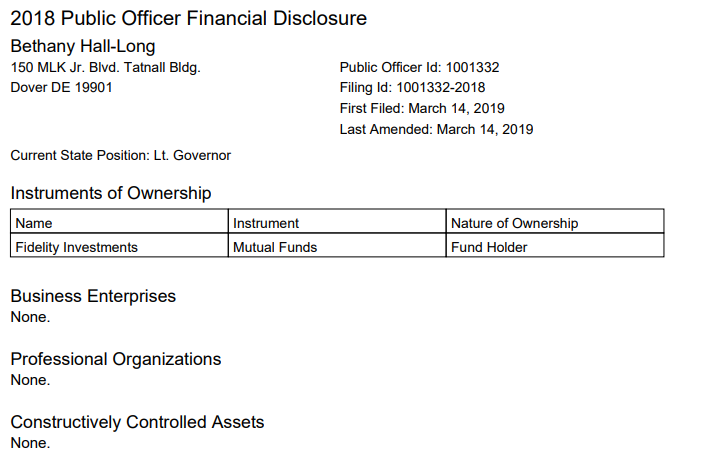
In response to an inquiry from WHYY News about why she has neglected to report her husband’s limited liability company or rental properties as the law mandates, Hall-Long issued a statement that suggested she’s not convinced such information is required.
“I take the Public Integrity Commission’s financial disclosure seriously and have always followed the commission’s guidance and years of existing precedent in filling out the forms, including regarding this LLC,” her statement said. “I have no ownership or involvement in the homes the LLC purchased, and I have never been a member, owner, or beneficiary of this LLC.”
Hall-Long’s statement didn’t address the language in the law that requires disclosure of a spouse’s assets.
Reports show officials routinely disclose spouse’s businesses, investments
While Hall-Long cited “years of existing precedent” as one reason she didn’t disclose her husband’s home rental business, WHYY News found that several elected and appointed officials disclose assets of spouses and children, including businesses and investment and retirement accounts. WHYY News reviewed four years of reports by all officials who filed them after obtaining them under the Freedom of Information Act.
For example, last year Secretary of State Jeffrey Bullock, former chief of staff to Gov. Tom Carper in the 1990s, listed seven separate stock and investment accounts of his wife.
State Rep. Paul Baumbach, a Newark Democrat, reported five financial accounts of his wife — three held jointly with him and two she holds separately.
Family Court Judge Michael Arrington disclosed his wife’s interior design firm.
State Rep. Danny Short, a Republican and former House minority leader, included a rental property he owns with his wife.
GOP House member Jeff Spiegelman of Clayton reported his wife’s individual retirement account and his children’s college savings plans.
Hall-Long did receive what she called “guidance” from the commission’s attorney about her obligations. But that didn’t occur until this October, after she received inquiries from a reporter about her failure to follow the law and disclose Dana Long’s businesses on five consecutive reports.
Deborah Moreau, the commission’s attorney, told WHYY News an aide of Hall-Long contacted her two months ago about the disclosure requirements for “a spouse’s business” and she mistakenly said it didn’t have to be reported.
“I inadvertently responded based upon a legal definition of ‘constructive control’ which requires that the public officer have the actual ability to influence or control a financial interest,” Moreau said. “The definition in the state of Delaware statute is more expansive and defines constructive control as any financial interest of a spouse or child.”
Moreau said she apologized for the miscommunication and stressed that when notices go out to officials in January for their 2023 reports, the commission will “clarify the need for public officers to disclose assets belonging to spouses and children.” The notice will also tell officials that they “may amend” their reports at any time.
Hall-Long’s statement added that she “will continue to follow the guidance from the commission and will make any appropriate modifications to my reports if advised to do so.”
But Claire Snyder-Hall, executive director of the government watchdog group Common Cause Delaware, said the lieutenant governor should not need a special reminder from the commission to know she should disclose her husband’s Section 8 rental business.
“It is clearly required by the Delaware code and we need public officers to follow the Delaware code because it’s very important for voters to be able to trust their elected officials,” Snyder-Hall said.
“Part of that is being able to see when there’s a potential conflict of interest, which is what that section of the code gets at — that you could be making decisions as a public officer that directly benefits yourself, or yourself indirectly by benefiting your spouse.”

Meyer said it’s clear to him that Hall-Long flouted the disclosure law, noting that he tells his staff to follow the county’s similar law, or else.
“If they play any games or fail to disclose something, that’s grounds” for discipline or dismissal, Meyer said. “I have zero tolerance as an employer for things like that. It’s a huge leap of faith that the public has given us to do stuff in their interest, and we need to go overboard to show them that we’re acting every way in their interest and not any personal interest.”
‘Get out in front of it or else the drip-drip is going to become a flood’
Only time will tell whether the current campaign finance and personal financial disclosure issues, along with others involving her husband, will affect Hall-Long’s chances in the Sept. 10 Democratic primary.
The election is still more than nine months away, and longtime Delaware political insiders say primaries hinge on having a strong organization to get supporters out to the polls, and by forging alliances with candidates in primaries for other offices. Turnout for primaries is far lower than for general elections.
Some of Hall-Long’s supporters have also told WHYY News privately that absent a “smoking gun” that she and/or her husband used campaign funds for personal expenses, voters likely would not penalize her for actions involving her husband.
Besides, they said, Dana Long’s name won’t be on the ballot, and he’s no longer the campaign treasurer.
Carney, who is exploring a possible run for mayor of Wilmington in 2024, hasn’t rescheduled his postponed fundraiser for his handpicked successor. Nor has the governor spoken publicly about the issues within Hall-Long’s campaign.
But Hall-Long has hired a new campaign manager and held several events to raise money, including one this week at the Christiana Hilton with leaders of organized labor in Delaware. Hall-Long also pledged through a campaign spokeswoman that she won’t seek repayment of the $101,149 balance for loans she first reported in November.
And she keeps racking up endorsements from members of the General Assembly. On Wednesday, she announced that the entire House Democratic leadership — Speaker Valerie Longhurst, Majority Leader Melissa Minor-Brown, and Majority Whip Kerri Evelyn Harris — are backing her.
Del. State Professor Hoff, however, says he suspects voters and potential donors still have plenty of questions, especially about the previously undisclosed $207,000 in payments to Dana Long.
Unless Hall-Long releases the audit that confirms her explanation that the money was to repay legitimate loans, he said, doubts will persist about how the lieutenant governor and her husband handled campaign money.
“The idea is for her to get out in front of it and put this thing to bed,” Hoff said. “Sooner rather than later, or else the drip-drip is going to become a flood.”

Get daily updates from WHYY News!
WHYY is your source for fact-based, in-depth journalism and information. As a nonprofit organization, we rely on financial support from readers like you. Please give today.





